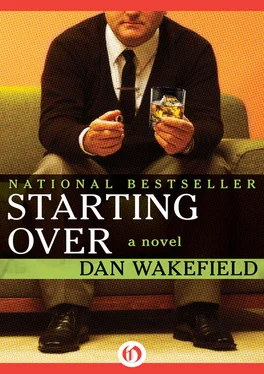Potter wondered what the girl at the Bertelsens’ would be like, the one who was divorced but had no children.
Renée finished off the last of her lamb and pilaf, and leaned back, smiling, in her chair. “Mmmm. I feel so indulgent.”
“Good,” Potter said. “I’m glad.”
“I even think I might go overboard and have a Baklava.”
Potter cleared his throat. He hadn’t yet got around to mentioning that they were going to the Bertelsens’ for dessert.
“Well,” he said, “uh, we sort of were invited to these friends, of mine, after dinner. For dessert and coffee.”
“Oh?”
Renée looked at him in a way that was interested, but slightly apprehensive.
“You’ll like them,” Potter said quickly. “But listen, you can have the Baklava too, if you want.” He smiled. “Be really indulgent.”
Renée straightened up in her chair and dabbed the napkin at her lips. “Oh, no. I’m actually stuffed, as it is.”
Potter glanced at his watch. “Well,” he said, “maybe we should go on over there.”
He divided up the last of the Retsina, gulping his own down thirstily. It tingled pleasantly, like a mouthwash. They had knocked off a full bottle of the stuff.
The Bertelsens and their guests were still around the dinner table when Potter and Renée arrived, just a few bites into dessert. It was Indian Pudding. Marva was in her New Englandy mood. There was also Paul Tuckerman and his wife, Lynn. Paul was a bright young Urban man at Harvard whom Potter had met briefly at a Bertelsen cocktail party. Tuckerman was said to have done some very important work in Redevelopment, and was often called to Washington. When he referred in conversation to “John,” he meant Mayor Lindsay. His wife Lynn had perfect teeth and displayed them often, in a stern, intimidating look that had the shape but not the spirit of a smile. She was working toward her doctorate in Education, and had a special interest in Criminal Rehabilitation. Potter believed her smile alone could significantly lower the rate of recidivism in any given Correctional Institution.
As Potter might have guessed, Hartley Stanhope was there. Stanhope, a lean man with distinguished grey hair, was a widower who had been the Bertelsens’ ace Eligible Bachelor, at least until Potter arrived on the scene. Now Potter and Stanhope vied for the top spot, alternating in favor as their stock rose and fell with Marva. Potter wasn’t really sure whether he disliked the man because of this rivalry, or because Stanhope occupied a secretive but influential position as a biological consultant to a government-backed Research Foundation. Potter imagined that Stanhope, the sort of scientific guy who smoked a pipe and sang in a Madrigal Group, probably thought up ways of poisoning the rice of the entire Asian land mass in the cleverest and most convenient manner.
Tonight, though, was one of the times that Potter felt less hostile toward Stanhope, perhaps because he knew that on this occasion Stanhope had been tapped as the Eligible Bachelor for dinner only after Potter had been unable to accept. Knowing that Stanhope was unaware of this made Potter feel even more benevolent toward him. And yet, there was an edge of jealousy, for Stanhope, even if second choice, had wound up as Dinner Partner for the Bertelsens’ new female discovery, a divorcée without any children.
Potter took one look at Marilyn Crashaw and quickly looked away, fearing his immediate attraction to her would be embarrassingly obvious. He grasped Renée’s hand under the table, and smiled at her. She looked at him suspiciously. He had never held her hand before.
After the Indian Pudding and espresso, the party moved to the Library for cognac and conversation. As was customary on these occasions, topics were discussed. Topics of Significance. But Potter was only vaguely aware of them, as they blurred across his mind, chalked words on a classroom blackboard.
Inflation. Indochina. Administration efforts to muzzle the press. Liz Drew’s insightful piece on “The White House Hard Hats” in the October Atlantic . The “no-knock” law and its implications for the future of privacy. An Agnew joke. Speculation on whether Pat Moynihan would last it out serving the Nixon administration, or return to Harvard. Where, it was generally agreed, he belonged.
Potter tried to keep his eyes off Marilyn Crashaw’s knees.
Marilyn wasn’t really “pretty”; her nose was too long, and had a slight bump on the bridge. Her teeth protruded just a little, just enough to be noticeable. Her figure was average, not fat or thin, neither voluptuous nor twiggy. Her hair was streaked blonde, and fell to her shoulders. Probably dyed or tinted. Maybe a wig or a fall. You never could tell anymore. So what was so terrific about her? Partly, perhaps, Potter was turned on by the way she dressed. It certainly wasn’t flashy by New York standards, but it was not the conservative attire of the thirty-and-over women in polite Boston-Cambridge society. The more style-conscious of those ladies had gone for the Midi in a big way this season, and the more traditional had stuck to what looked to Potter like the old cocktail dresses of the Fifties, but raised a little above the knee instead of a little above the ankle. And long hair was a no-no, except for their teen-age daughters. Marilyn, who was certainly no teen-ager, but probably around Potter’s own age, wore a plain white blouse with a gold-chain sort of necklace, a miniskirt, and boots. The boots were not extreme or kinky, but neither did they look primarily practical, as if designed for spending a year at Ice Station Zebra. The outfit looked good and Marilyn wore it with confidence, her whole manner seeming assured and at ease, as if to say Here I am, if you don’t like it, too bad. And Potter liked it, the overall impression. And her eyes really topped it off. From the first glance, her eyes seemed not only to look at him but to look into him, saying a secret and intimate hello .
When enough time and conversation had passed to be able to make a proper exit, Potter took Renée’s hand again, squeezed it, and said to the others they had better be off, said good night to each one in turn, and when he nodded, stiffly, self-consciously, to Marilyn, she smiled, and her eyes said see you later .
In the car going home Potter talked a lot, faster than usual. He talked of the Bertelsens, of the Boston scene, of the Harvard crowd, of the evening. But he never mentioned Marilyn. When they got to his place he made drinks and put the classical guitar record on. He did not really want to go to bed with Renée, but he knew it would be taken as an insult if he did not, if he did not at least try, and so he got pretty sloshed, and managed to do what he conceived to be his duty. Through it all, he kept seeing Marilyn’s eyes. Afterward he drove Renée home, talking more, concentrating on not mentioning the one thought that really occupied his mind: Marilyn. Renée was especially silent, curled in her seat, huddled deep in her coat. The only thing she said, just before the car pulled up in front of her door, was a question asked in a tone of cool, pretended casualness: “Who was that bitch?”
It was Sunday, the worst of days, the hardest one to get through alone. It yawned open, a pit of silence. There was little traffic, most of the shops and stores were closed, and the sidewalks were almost deserted. Potter once was able to fill up a large hunk of the day in football season by watching The Pros, but this year, on the second autumn Sunday, watching the Houston Oilers combat the Oakland Raiders, Potter was swept with a wave of depression; as the two teams blammed into one another, as a quarterback was thrown for a loss or sent a long bomb soaring into the waiting grasp of a fleet-footed receiver, as a fullback hurled himself into the enemy Front Four or a kicking specialist connected for a field goal, Potter had a deep and despairing feeling that he was watching the same game he had watched ten years before, that it was all the same, the plays and uniforms and the announcer’s analysis, that nothing was different except Potter, who was ten years older, with little to show for it; that in another ten years he would still be sitting of a Sunday afternoon and watching the same game, just that many more relentless seasons closer to The End. With a feeling almost of revulsion, he violently switched off the set, and had not turned to Football since then. Which opened up a bigger hole in his Sunday—big enough for a monster fullback to plunge through without being touched.
Читать дальше












